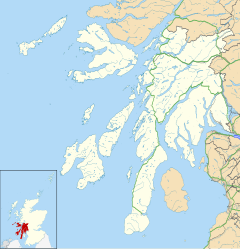Rothesay, Isle of Bute
Rothesay
|
|
|---|---|
 Rothesay Pier. |
|
| Rothesay shown within Argyll and Bute | |
| Population | 4,850 |
| OS grid reference | NS 08737 64529 |
| District |
|
| Council area |
|
| Lieutenancy area |
|
| Country | Scotland |
| Sovereign state | United Kingdom |
| Post town | ISLE OF BUTE |
| Postcode district | PA20 |
| Dialling code | 01700 |
| EU Parliament | Scotland |
| UK Parliament |
|
| Scottish Parliament |
|
The City of Rothesay /ˈrɒθ.si/ (Scottish Gaelic: Baile Bhòid) is the principal town on the Isle of Bute, in the council area of Argyll and Bute, Scotland. It can be reached by ferry from Wemyss Bay which offers an onward rail link to Glasgow. At the centre of the town is Rothesay Castle, a ruined castle which dates back to the 13th century, and which is unique in Scotland for its circular plan. Rothesay lies along the coast of the Firth of Clyde.
The old town centred around Rothesay Castle, which dates from the 13th century. Long-ruinous it is nevertheless picturesque, and formed a focal point for tourists from the beginning of its evolution into a seaside resort.
Rothesay was the county town in the civil parish of Rothesay in county of Bute, which included the islands of Great Cumbrae, Little Cumbrae and Arran. The county buildings, now partially closed down, overlook the castle.
During the Victorian era, Rothesay developed as a popular tourist destination. It became hugely popular with Glaswegians going "doon the watter" (lit: down the water, where the 'water' in question is the Firth of Clyde), and its wooden pier was once much busier with steamer traffic than it is today. Rothesay was also the location of one of Scotland's many hydropathic establishments during the 19th century boom years of the Hydropathy movement. The town also had an electric tramway - the Rothesay and Ettrick Bay Light Railway - which stretched across the island to one of its largest beaches. However, this closed in the mid-1930s. The centre of activities was the Winter Gardens building (built 1923) which played host to some of the best known music hall entertainers of the day.
...
Wikipedia

